theautobiographyfrombenjaminfranklin内容赏析本杰明富兰克林自传赏
The-Autobiographyof-Benjamin-Franklin

How He Started the Table
B.F did lots of reading and found that people defined virtues differently. He decided to make his own virtue form." I propos’d to myself, for the sake of clearness, to use rather more names, with fewer ideas annex’d to each, than a few names with more ideas". He included 13 names of virtues. These are more clarified, and express B.J's meanings.
Education. Not only in the first paragraph. Sharing experiences and thoughts.
Improvement of the well-being of more people. (Utilitarianism)
第六页,编辑于星期日:二十三点 五十一分。
spread these virtues. One shouldn't live without any restrictions. B.F designed a table to make sure he was being better, more moral, more rational.
第十二页,编辑于星期日:二十三点 五十一分。
2. 沉默寡言SILENCE. Speak not but what may benefit others or yourself; avoid trifling conversation.
The-Autobiography-from-Benjamin-Franklin内容赏析本杰明富兰克林自传赏析讲解学习
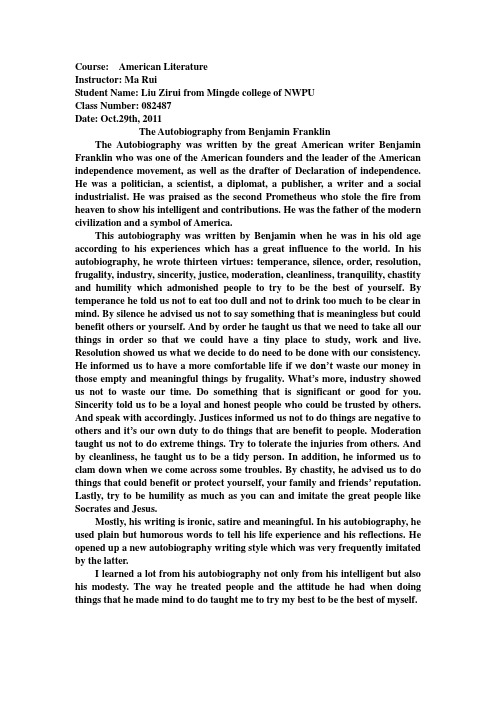
Course: American LiteratureInstructor: Ma RuiStudent Name: Liu Zirui from Mingde college of NWPUClass Number: 082487Date: Oct.29th, 2011The Autobiography from Benjamin FranklinThe Autobiography was written by the great American writer Benjamin Franklin who was one of the American founders and the leader of the American independence movement, as well as the drafter of Declaration of independence. He was a politician, a scientist, a diplomat, a publisher, a writer and a social industrialist. He was praised as the second Prometheus who stole the fire from heaven to show his intelligent and contributions. He was the father of the modern civilization and a symbol of America.This autobiography was written by Benjamin when he was in his old age according to his experiences which has a great influence to the world. In his autobiography, he wrote thirteen virtues: temperance, silence, order, resolution, frugality, industry, sincerity, justice, moderation, cleanliness, tranquility, chastity and humility which admonished people to try to be the best of yourself. By temperance he told us not to eat too dull and not to drink too much to be clear in mind. By silence he advised us not to say something that is meaningless but could benefit others or yourself. And by order he taught us that we need to take all our things in order so that we could have a tiny place to study, work and live. Resolution showed us what we decide to do need to be done with our consistency. He informed us to have a more comfortable life if we don’t waste our money in those empty and meaningful things by frugality. What’s more, industry showed us not to waste our time. Do something that is significant or good for you. Sincerity told us to be a loyal and honest people who could be trusted by others. And speak with accordingly. Justices informed us not to do things are negative to others and it’s our own duty to do things that are benefit to people. Moderation taught us not to do extreme things. Try to tolerate the injuries from others. And by cleanliness, he taught us to be a tidy person. In addition, he informed us to clam down when we come across some troubles. By chastity, he advised us to do things that could benefit or protect yourself, your family and friends’ reputation. Lastly, try to be humility as much as you can and imitate the great people like Socrates and Jesus.Mostly, his writing is ironic, satire and meaningful. In his autobiography, he used plain but humorous words to tell his life experience and his reflections. He opened up a new autobiography writing style which was very frequently imitated by the latter.I learned a lot from his autobiography not only from his intelligent but also his modesty. The way he treated people and the attitude he had when doing things that he made mind to do taught me to try my best to be the best of myself.。
美国文学选读第3版翻译-陶洁
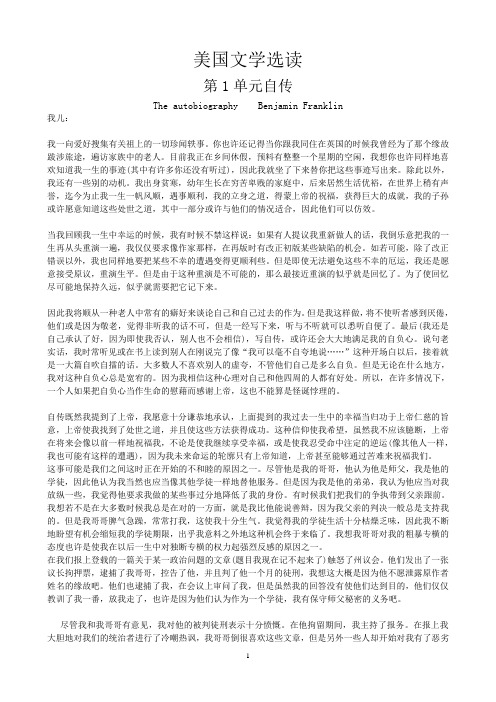
美国文学选读第1单元自传The autobiography Benjamin Franklin我儿:我一向爱好搜集有关祖上的一切珍闻轶事。
你也许还记得当你跟我同住在英国的时候我曾经为了那个缘故跋涉旅途,遍访家族中的老人。
目前我正在乡间休假,预料有整整一个星期的空闲,我想你也许同样地喜欢知道我一生的事迹(其中有许多你还没有听过),因此我就坐了下来替你把这些事迹写出来。
除此以外,我还有一些别的动机。
我出身贫寒,幼年生长在穷苦卑贱的家庭中,后来居然生活优裕,在世界上稍有声誉,迄今为止我一生一帆风顺,遇事顺利,我的立身之道,得蒙上帝的祝福,获得巨大的成就,我的子孙或许愿意知道这些处世之道,其中一部分或许与他们的情况适合,因此他们可以仿效。
当我回顾我一生中幸运的时候,我有时候不禁这样说:如果有人提议我重新做人的话,我倒乐意把我的一生再从头重演一遍,我仅仅要求像作家那样,在再版时有改正初版某些缺陷的机会。
如若可能,除了改正错误以外,我也同样地要把某些不幸的遭遇变得更顺利些。
但是即使无法避免这些不幸的厄运,我还是愿意接受原议,重演生平。
但是由于这种重演是不可能的,那么最接近重演的似乎就是回忆了。
为了使回忆尽可能地保持久远,似乎就需要把它记下来。
因此我将顺从一种老人中常有的癖好来谈论自己和自己过去的作为。
但是我这样做,将不使听者感到厌倦,他们或是因为敬老,觉得非听我的话不可,但是一经写下来,听与不听就可以悉听自便了。
最后(我还是自己承认了好,因为即使我否认,别人也不会相信),写自传,或许还会大大地满足我的自负心。
说句老实话,我时常听见或在书上读到别人在刚说完了像“我可以毫不自夸地说……”这种开场白以后,接着就是一大篇自吹自擂的话。
大多数人不喜欢别人的虚夸,不管他们自己是多么自负。
但是无论在什么地方,我对这种自负心总是宽宥的。
因为我相信这种心理对自己和他四周的人都有好处。
所以,在许多情况下,一个人如果把自负心当作生命的慰藉而感谢上帝,这也不能算是怪诞悖理的。
The Autobiography of Benjamin Franklin
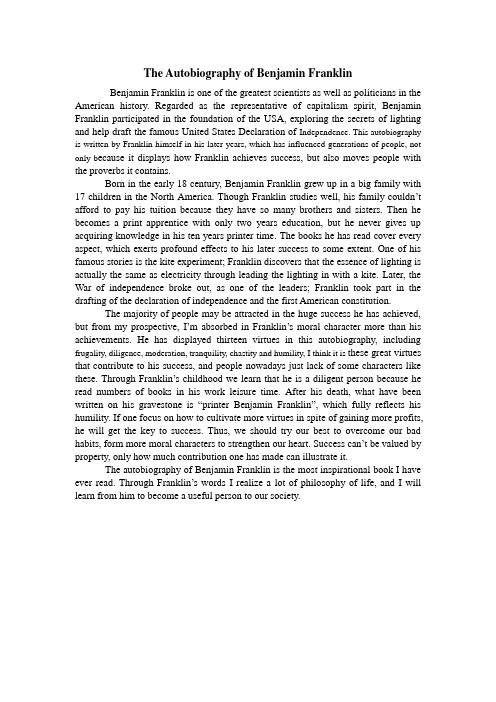
The Autobiography of Benjamin FranklinBenjamin Franklin is one of the greatest scientists as well as politicians in the American history. Regarded as the representative of capitalism spirit, Benjamin Franklin participated in the foundation of the USA, exploring the secrets of lighting and help draft the famous United States Declaration of Independence. This autobiography is written by Franklin himself in his later years, which has influenced generations of people, not only b ecause it displays how Franklin achieves success, but also moves people with the proverbs it contains.Born in the early 18 century, Benjamin Franklin grew up in a big family with 17 children in the North America. Though Franklin studies well, his family couldn’t afford to pay his tuition because they have so many brothers and sisters. Then he becomes a print apprentice with only two years education, but he never gives up acquiring knowledge in his ten years printer time. The books he has read cover every aspect, which exerts profound effects to his later success to some extent. One of his famous stories is the kite experiment; Franklin discovers that the essence of lighting is actually the same as electricity through leading the lighting in with a kite. Later, the War of independence broke out, as one of the leaders; Franklin took part in the drafting of the declaration of independence and the first American constitution.The majority of people may be attracted in the huge success he has achieved, but from my prospective, I’m absorbed in Franklin’s moral character more than his achievements. He has displayed thirteen virtues in this autobiography, including frugality, diligence, moderation, tranquility, chastity and humility, I think it is these great virtues that contribute to his success, and people nowadays just lack of some characters like these. Through Franklin’s childhood we learn that he is a diligent person because he read numbers of books in his work leisure time. After his death, what have been written on his gravestone is “printer Benjamin Franklin”, which fully reflects his humility. If one focus on how to cultivate more virtues in spite of gaining more profits, he will get the key to success. Thus, we should try our best to overcome our bad habits, form more moral characters to strengthen our heart. Success can’t be valued by property, only how much contribution one has made can illustrate it.The autobiography of Benjamin Franklin is the most inspirational book I have ever read. Through Franklin’s words I realize a lot of philosophy of life, and I will learn from him to become a useful person to our society.。
Autobiography

Autobiography--- Benjamin FranklinThe Autobiography of Benjamin Franklin is thetraditional name for the unfinished record of his ownlife written by Benjamin Franklin from 1771 to 1790;however, Franklin himself appears to have called thework his Memoirs. Although it had a tortuouspublication history after Franklin's death, this workhas become one of the most famous and influentialexamples of an autobiography ever written.Franklin's account of his life is divided into fourparts, reflecting the different periods at which hewrote them. There are actual breaks in the narrativebetween the first three parts, but Part Three's narrative continues into Part Four without an authorial break (only an editorial one).Part OnePart one of the Autobiography is addressed to Franklin's son William, at that time (1771) Royal Governor of New Jersey. While in England at the estate of the Bishop of St Asaph in Twyford, Franklin, now 65 year old, begins by saying that it may be agreeable to his son to know some of the incidents of his father's life; so with a week's uninterrupted leisure, he is beginning to write them down for William. He starts with some anecdotes of his grandfather, uncles, father and mother. He deals with his childhood, his fondness for reading, and his service as an apprentice to his brother James Franklin, a Boston printer and the publisher of the New England Courant. After improving his writing skills through study of the Spectator by Joseph Addison and Sir Richard Steele, he writes an anonymous paper and slips it under the door of the printing house by night. Not knowing its author, James and his friends praise the paper and it is published in the Courant, which encourages Ben to produce more essays (the "Silence Dogood" essays) which are also published. When Ben reveals his authorship, James is angered; thinking the recognition of his papers will make Ben too vain. James and Ben have frequent disputes and Ben seeks for a way to escape from working under James.Eventually James gets in trouble with the colonial assembly, which jails him for a short time and then forbids him to continue publishing his paper. James and his friends come up with the stratagem that the Courant should hereafter be published under the name of Benjamin Franklin, although James will still actually be in control. James signs a discharge of Ben's apprenticeship papers but writes up new private indenture papers for Ben to sign which will secure Ben's service for the remainder of the agreed time. But when a fresh disagreement arises between the brothers, Ben chooses to leave James, correctly judging that James will not dare to produce the secret indenture papers. ("It was not fair in me to take this Advantage," Franklin comments, "and this I therefore reckon one of the first Errata of my life.") James does, however, make it impossible for Ben to get work anywhere else in Boston. Sneaking onto a ship without his father's or brother's knowledge, Ben heads for New York, but the printer William Bradford is unable to employ him; however, he tells Ben that his son Andrew, a Philadelphia printer, may be able to use him since one of his son'sprincipal employees had just died.By the time Ben reaches Philadelphia, Andrew Bradford has already replaced his employee, but refers Ben to Samuel Keimer, another printer in the city, who is able to give him work. The Governor, Sir William Keith, takes notice of Franklin and offers to set him up in business for himself. On Keith's recommendation, Franklin goes to London for printing supplies, but when he arrives, he finds that Keith has not written the promised letter of recommendation for him, and that "no one who knew him had the smallest Dependence on him." Franklin finds work in London until an opportunity arises of returning to Philadelphia as an assistant to Thomas Denham, a Quaker merchant; but when the Denham takes ill and dies, he returns to manage Keimer's shop. Keimer soon comes to feel that Franklin's wages are too high and provokes a quarrel which causes the latter to quit. At this point a fellow employee, Hugh Meredith, suggests that Franklin and he set up a partnership to start a printing shop of their own; this is subsidized by funds from Meredith's father, though most of the work is done by Franklin as Meredith is not much of a press worker and is given to drinking.They establish their business, and plan to start a newspaper, but when Keimer hears of this plan, he rushes out a paper of his own, the Pennsylvania Gazette. This publication limps along for three quarters of a year before Franklin buys the paper from Keimer and makes it "extremely profitable." (The Saturday Evening Post traces its lineage to Franklin's Pennsylvania Gazette.) The partnership also receives an appointment as printer for the Pennsylvania assembly. When Hugh Meredith's father experiences financial setbacks and cannot continue backing the partnership, two friends separately offer to lend Franklin the money he needs to stay in business; the partnership amicably dissolves as Meredith goes to North Carolina, and Franklin takes from each friend half the needed sum, continuing his business in his own name. In 1730 he marries Deborah Read, and after this, with the help of the league of ordinary gentlemen,[1] he draws up proposals for a "Subscription Library"—the first public library. At this point Part One breaks off, with a memo in Franklin's writing noting that "The Affairs of the Revolution occasion'd the Interruption".Part TwoThe second part begins with two letters Franklin received in the early 1780s while in Paris, encouraging him to continue the Autobiography, of which both correspondents have read Part One. (Although Franklin does not say so, there had been a breach with his son William after the writing of Part One, since the father had sided with the Revolutionaries and the son had remained loyal to the British Crown.)At Passy, a suburb of Paris, Franklin begins Part Two in 1784, giving a more detailed account of his public library plan. He then discusses his "bold and arduous Project of arriving at moral Perfection", listing thirteen virtues he wishes to perfect in himself. He creates a book with columns for each day of the week, in which he marks with black spots his offenses against each virtue.[1]Of these virtues, he notices that Order is the hardest for him to keep. He eventually realizes that perfection is not to be attained, but feels himself better and happier because of his attempt.Part ThreeBeginning in August 1788 when Franklin had returned to Philadelphia, the author says he will not be able to utilize his papers as much as he had expected, since many were lost inthe recent Revolutionary War. He has, however, found and quotes a couple of his writings from the 1730s that survived. One is the "Substance of an intended Creed" consisting of what he then considered to be the "Essentials" of all religions. He had intended this as a basis for a projected sect but, Franklin says, did not pursue the project.In 1732, Franklin first publishes his Poor Richard's Almanac, which becomes very successful. He also continues his profitable newspaper. In 1734, a preacher named Rev. Samuel Hemphill arrives from County Tyrone Ireland; Franklin supports him and writes pamphlets on his behalf. However, someone finds out that Hemphill has been plagiarizing portions of his sermons from others; although Franklin rationalizes this by saying he would rather hear good sermons taken from others than poor sermons of the man's own composition.Franklin studies languages, reconciles with his brother James, and loses a four-year-old son to smallpox. Franklin's club, the Junto, grows and breaks up into subordinate clubs. Franklin becomes Clerk of the General Assembly in 1736, and the following year becomes Comptroller to the Postmaster General, which makes it easier to get reports and fulfill subscriptions for his newspaper. He proposes improvements to the city' watch and fire prevention regulations.The famed preacher George Whitefield arrives in 1739 and despite significant differences in their religious beliefs, Franklin assists Whitefield by printing his sermons and journals and lodging him in his house. As Franklin continues to succeed, he provides the capital for several of his workers to start printing houses of their own in other colonies. He makes further proposals for the public good, including some for the defense of Pennsylvania, which cause him to contend with the pacifist position of the Quakers.In 1740 he invents the Franklin stove, refusing a patent on the device because it was for "the good of the people". He proposes an academy, which opens after money is raised by subscription for it and it expands so much that a new building has to be constructed for it. Franklin obtains other governmental positions (city councilman, alderman, burgess, justice of the peace) and helps negotiate a treaty with the Indians. After helping Dr. Thomas Bond establish a hospital, he helps pave the streets of Philadelphia and draws up a proposal for Dr. John Fothergill about doing the same in London. In 1753 Franklin becomes Deputy Postmaster General.The next year, as war with the French is expected, representatives of the several colonies, including Franklin, meet with the Indians to discuss defense; Franklin at this time draws up a proposal for the union of the colonies, but it is not adopted. General Braddock arrives with two regiments, and Franklin helps him secure wagons and horses, but the general refuses to take Ben's warning about danger from hostile Indians during Braddock's planned march to Frontenac (now Kingston, Ontario). When Braddock's troops are subsequently attacked, the general is mortally wounded and his forces abandon their supplies and flee.A militia is formed on the basis of a proposal by Benjamin Franklin, and the governor asks him to take command of the northwestern frontier. With his son as aide de camp, Franklin heads for Gnadenhut, raising men for the militia and building forts. Returning to Philadelphia, he is chosen colonel of the regiment; his officers honor him by personally escorting him out of town. This attention offends the proprietor of the colony (Thomas Penn, son of William Penn) when someone writes an account of it in a letter to him, whereupon theproprietor complains to the government in England about Franklin.Now the Autobiography discusses "the Rise and Progress of [Franklin's] Philosophical Reputation." He starts experiments with electricity and writes letters about them that are published in England as a book. Franklin's description of his experiments is translated into French, and AbbéNollet, who is offended because this work calls into question his own theory of electricity, publishes his own book of letters attacking Franklin. Declining to respond on the grounds that anyone could duplicate and thus verify his experiments, Franklin sees another French author refute Nollet, and as Franklin's book is translated into other languages, its views are gradually accepted and Nollet's are discarded. Franklin is also voted an honorary member of the Royal Society.A new governor arrives, but disputes between the assembly and the governor continue. (Since the colonial governors are bound to fulfill the instructions issued by the colony's proprietor, there is a continuing struggle for power between the legislature and the governor and proprietor.) The assembly is on the verge of sending Franklin to England to petition the King against the governor and proprietor, but meanwhile Lord Loudoun arrives on behalf of the English government to mediate the differences. Franklin nevertheless goes to England accompanied by his son, after stopping at New York and making an unsuccessful attempt to be recompensed by Loudoun for his outlay of funds during his militia service. They arrive in England on July 27, 1757.Part FourWritten sometime between November 1789 and Franklin's death on April 17, 1790, this section is very brief. After Franklin and his son arrive in London, the former is counselled by Dr. Fothergill on the best way to advocate his cause on behalf of the colonies. Franklin visits Lord Granville, president of the King's Privy Council, who asserts that the king is the legislator of the colonies? Franklin then meets the proprietaries (the switch to the plural is Franklin's, so apparently others besides Thomas Penn are involved). But the respective sides are far from any kind of agreement. The proprietaries ask Franklin to write a summary of the colonists' complaints; when he does so, their solicitor for reasons of personal enmity delays a response. Over a year later, the proprietaries finally respond to the assembly, regarding the summary to be a "flimsy Justification of their Conduct." During this delay the assembly has prevailed on the governor to pass a taxation act, and Franklin defends the act in English court so that it can receive royal assent. While the assembly thanks Franklin, the proprietaries, enraged at the governor, turn him out and threaten legal action against him; in the last sentence, Franklin tells us the governor "despis'd the Threats, and they were never put in Execution".It is apparent that Franklin intended to cover more ground, because an outline of the Autobiography written by him and copied by Henry ends with a reference to the Treaty of Paris, which Franklin helped negotiate, so the obvious inference is that Franklin's death prevented his proceeding further with the Autobiography.。
The autobiography of Benjamin Franklin精品读后感
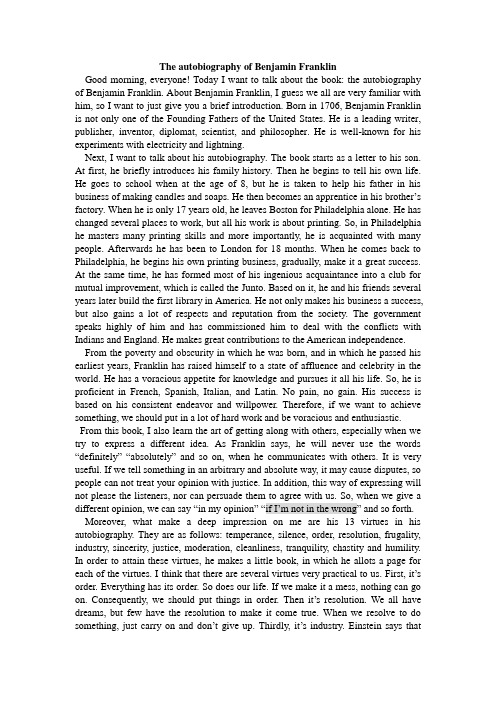
The autobiography of Benjamin FranklinGood morning, everyone! Today I want to talk about the book: the autobiography of Benjamin Franklin. About Benjamin Franklin, I guess we all are very familiar with him, so I want to just give you a brief introduction. Born in 1706, Benjamin Franklin is not only one of the Founding Fathers of the United States. He is a leading writer, publisher, inventor, diplomat, scientist, and philosopher. He is well-known for his experiments with electricity and lightning.Next, I want to talk about his autobiography. The book starts as a letter to his son. At first, he briefly introduces his family history. Then he begins to tell his own life. He goes to school when at the age of 8, but he is taken to help his father in his business of making candles and soaps. He then becomes an apprentice in his brother’s factory. When he is only 17 years old, he leaves Boston for Philadelphia alone. He has changed several places to work, but all his work is about printing. So, in Philadelphia he masters many printing skills and more importantly, he is acquainted with many people. Afterwards he has been to London for 18 months. When he comes back to Philadelphia, he begins his own printing business, gradually, make it a great success. At the same time, he has formed most of his ingenious acquaintance into a club for mutual improvement, which is called the Junto. Based on it, he and his friends several years later build the first library in America. He not only makes his business a success, but also gains a lot of respects and reputation from the society. The government speaks highly of him and has commissioned him to deal with the conflicts with Indians and England. He makes great contributions to the American independence. From the poverty and obscurity in which he was born, and in which he passed his earliest years, Franklin has raised himself to a state of affluence and celebrity in the world. He has a voracious appetite for knowledge and pursues it all his life. So, he is proficient in French, Spanish, Italian, and Latin. No pain, no gain. His success is based on his consistent endeavor and willpower. Therefore, if we want to achieve something, we should put in a lot of hard work and be voracious and enthusiastic. From this book, I also learn the art of getting along with others, especially when we try to express a different idea. As Franklin says, he will never use the words “definitely” “absolutely”and so on, when he communicates with others. It is very useful. If we tell something in an arbitrary and absolute way, it may cause disputes, so people can not treat your opinion with justice. In addition, this way of expressing will not please the listeners, nor can persuade them to agree with us. So, when we give a different opinion, we can say “in my opinion” “if I’m not in the wrong” and so forth. Moreover, what make a deep impression on me are his 13 virtues in his autobiography. They are as follows: temperance, silence, order, resolution, frugality, industry, sincerity, justice, moderation, cleanliness, tranquility, chastity and humility. In order to attain these virtues, he makes a little book, in which he allots a page for each of the virtues. I think that there are several virtues very practical to us. First, it’s order. Everything has its order. So does our life. If we make it a mess, nothing can go on. Consequently, we should put things in order. Then it’s resolution. We all have dreams, but few have the resolution to make it come true. When we resolve to do something, just carry on and don’t give up. Thirdly, it’s industry. Einstein says thatgenius is 1% inspiration and 99% perspiration. No one could succeed without hard working. Therefore, don’t waste time and work hard, we will harvest a lot. Finally, it’s sincerity. Being sincere is very important, especially to friends. The maintenance of a friendship is not only based on the mutual trust and understanding, but also based on the sincerity.In a word, I benefit a lot from his autobiography. The words he uses are easy to understand and quite philosophical. Moreover, the way he conducts himself teaches me a lot. And more importantly, I learn that nothing in the world is impossible, if you set your mind to do it.。
20120312,From The Autobiography富兰克林自传部分
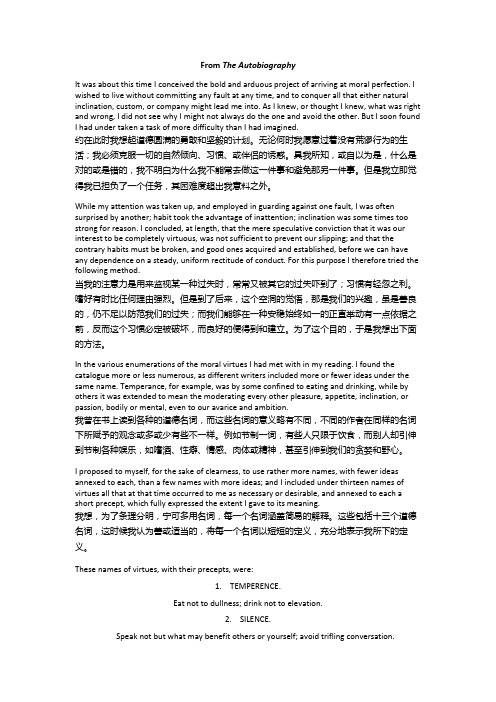
From The AutobiographyIt was about this time I conceived the bold and arduous project of arriving at moral perfection. I wished to live without committing any fault at any time, and to conquer all that either natural inclination, custom, or company might lead me into. As I knew, or thought I knew, what was right and wrong, I did not see why I might not always do the one and avoid the other. But I soon found I had under taken a task of more difficulty than I had imagined.约在此时我想起道德圆满的勇敢和坚毅的计划。
无论何时我愿意过着没有荒谬行为的生活;我必须克服一切的自然倾向、习惯、或伴侣的诱惑。
具我所知,或自以为是,什么是对的或是错的,我不明白为什么我不能常去做这一件事和避免那另一件事。
但是我立即觉得我已担负了一个任务,其困难度超出我意料之外。
While my attention was taken up, and employed in guarding against one fault, I was often surprised by another; habit took the advantage of inattention; inclination was some times too strong for reason. I concluded, at length, that the mere speculative conviction that it was our interest to be completely virtuous, was not sufficient to prevent our slipping; and that the contrary habits must be broken, and good ones acquired and established, before we can have any dependence on a steady, uniform rectitude of conduct. For this purpose I therefore tried the following method.当我的注意力是用来监视某一种过失时,常常又被其它的过失吓到了;习惯有轻忽之利。
富兰克林自传——TheAutobiographyofBenjaminFranklin
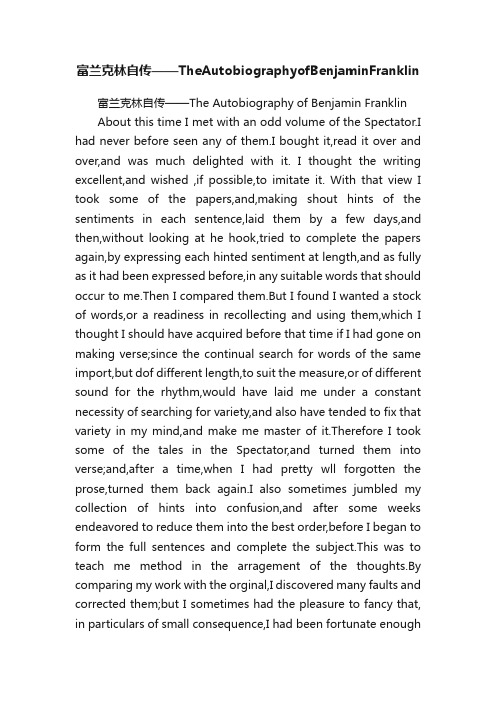
富兰克林自传——TheAutobiographyofBenjaminFranklin富兰克林自传——The Autobiography of Benjamin FranklinAbout this time I met with an odd volume of the Spectator.I had never before seen any of them.I bought it,read it over and over,and was much delighted with it. I thought the writing excellent,and wished ,if possible,to imitate it. With that view I took some of the papers,and,making shout hints of the sentiments in each sentence,laid them by a few days,and then,without looking at he hook,tried to complete the papers again,by expressing each hinted sentiment at length,and as fully as it had been expressed before,in any suitable words that should occur to me.Then I compared them.But I found I wanted a stock of words,or a readiness in recollecting and using them,which I thought I should have acquired before that time if I had gone on making verse;since the continual search for words of the same import,but dof different length,to suit the measure,or of different sound for the rhythm,would have laid me under a constant necessity of searching for variety,and also have tended to fix that variety in my mind,and make me master of it.Therefore I took some of the tales in the Spectator,and turned them into verse;and,after a time,when I had pretty wll forgotten the prose,turned them back again.I also sometimes jumbled my collection of hints into confusion,and after some weeks endeavored to reduce them into the best order,before I began to form the full sentences and complete the subject.This was to teach me method in the arragement of the thoughts.By comparing my work with the orginal,I discovered many faults and corrected them;but I sometimes had the pleasure to fancy that, in particulars of small consequence,I had been fortunate enoughto improve the method or the language,and this encouraged me to think that I might in time comt to be tolerate English writer,of which I was extremely ambitious.差不多这一时期我得到一本叫《旁观者》的奇怪册子。
- 1、下载文档前请自行甄别文档内容的完整性,平台不提供额外的编辑、内容补充、找答案等附加服务。
- 2、"仅部分预览"的文档,不可在线预览部分如存在完整性等问题,可反馈申请退款(可完整预览的文档不适用该条件!)。
- 3、如文档侵犯您的权益,请联系客服反馈,我们会尽快为您处理(人工客服工作时间:9:00-18:30)。
T h e A u t o b i o g r a p h y
f r o m B e n j a m i n
F r a n k l i n内容赏析本杰明富兰克林自传赏析
-CAL-FENGHAI.-(YICAI)-Company One1
Course: American Literature
Instructor: Ma Rui
Student Name: Liu Zirui from Mingde college of NWPU
Class Number: 082487
Date: , 2011
The Autobiography from Benjamin Franklin
The Autobiography was written by the great American writer Benjamin Franklin who was one of the American founders and the leader of the American independence movement, as well as the drafter of Declaration of independence. He was a politician, a scientist, a diplomat, a publisher, a writer and a social industrialist. He was praised as the second Prometheus who stole the fire from heaven to show his intelligent and contributions. He was the father of the modern civilization and a symbol of America.
This autobiography was written by Benjamin when he was in his old age according to his experiences which has a great influence to the world. In his autobiography, he wrote thirteen virtues: temperance, silence, order, resolution, frugality, industry, sincerity, justice, moderation, cleanliness, tranquility, chastity and humility which admonished people to try to be the best of yourself. By temperance he told us not to eat too dull and not to drink too much to be clear in mind. By silence he advised us not to say something that is meaningless but could benefit others or yourself. And by order he taught us that we need to take all our things in order so that we could have a tiny place to study, work and live. Resolution showed us what we decide to do need to be done with our consistency. He informed us to have a more comfortable life if we don’t waste our money in those empty and meaningful things by frugality. What’s more, industry showed us not to waste our time. Do something that is significant or good for you. Sincerity told us to be a loyal and honest people who could be trusted by others. And speak with accordingly. Justices informed us not to do things are negative to others and it’s our own duty to do things that are benefit to people. Moderation taught us not to do extreme things. Try to tolerate the injuries from others. And by cleanliness, he taught us to be a tidy person. In addition, he informed us to clam down when we come across some troubles. By chastity, he advised us to do things that could benefit or protect yourself, your family and friends’ reputation. Lastly, try to be humility as much as you can and imitate the great people like Socrates and Jesus.
Mostly, his writing is ironic, satire and meaningful. In his autobiography, he used plain but humorous words to tell his life experience and his reflections. He opened up a new autobiography writing style which was very frequently imitated by the latter.
I learned a lot from his autobiography not only from his intelligent but also his modesty. The way he treated people and the attitude he had when doing things that he made mind to do taught me to try my best to be the best of myself.
2。
